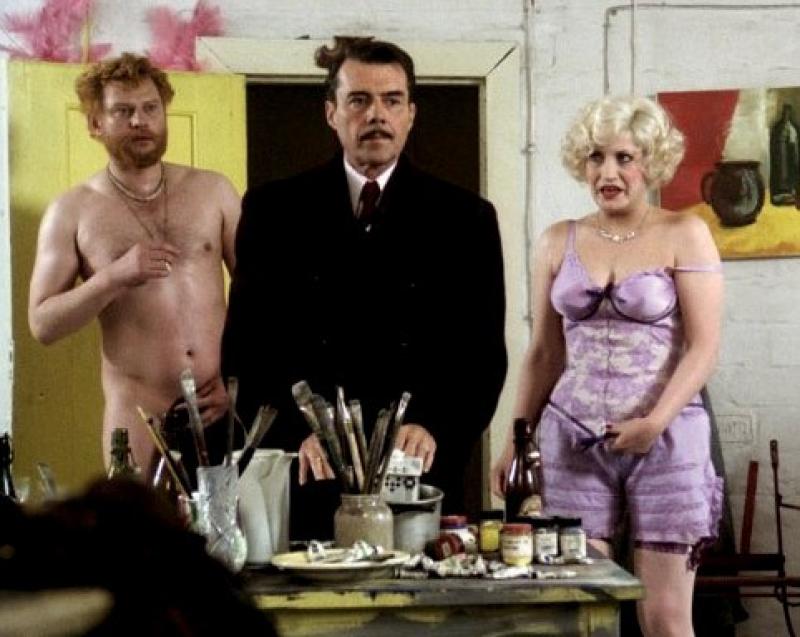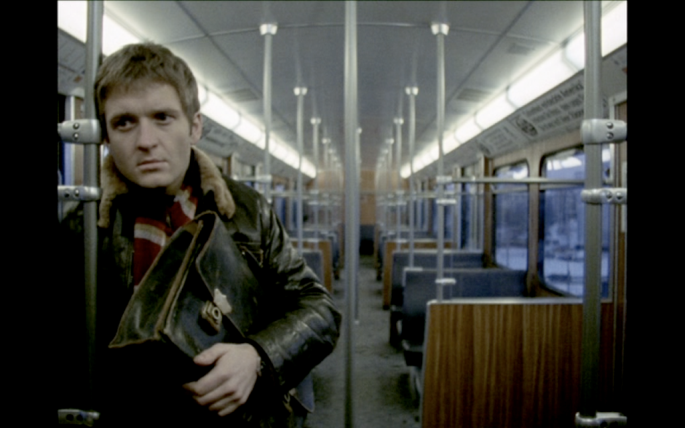DVD: Despair/I Only Want You To Love Me | reviews, news & interviews
DVD: Despair/I Only Want You To Love Me
DVD: Despair/I Only Want You To Love Me
Two Fassbinder films from the 1970s illuminate his gifts while exposing his weaknesses

Rainer Werner Fassbinder, the wunderkind of New German Cinema, worked at a prodigious rate. By the time of his death in 1982, aged just 37, he’d made over 40 feature films and directed over half as many stage plays. He also made films specially commissioned for television, something that was certainly looked down upon by both mainstream and avant-garde film-makers in the Seventies.
I Only Want You to Love Me, 1976 is his first television venture. It’s also said to be his most autobiographical film, and certainly his most Freudian. It tells the story of a naïve young man, Peter (Vitus Zeplichal, pictured below), a builder by trade, who builds a house for his parents but cannot win their love. In an early flashback scene that sees him as a little boy, he is beaten by his mother for bringing her flowers pilfered from a neighbour’s garden. Later we find him lavishing gifts on his young bride, and he soon spirals into debt. His eventual mental collapse leads him to kill a man who is the double of his father (both parts are played by Alexander Allerson).
 The idea of the doppelganger is taken further in the more stylised Despair, 1978, an adaptation from a 1934 Nabakov novel, with a screenplay by Tom Stoppard. It was Fassbinder’s first English-speaking film (he made three) and the first in which he used international stars, working with a budget that exceeded his first 15 films together.
The idea of the doppelganger is taken further in the more stylised Despair, 1978, an adaptation from a 1934 Nabakov novel, with a screenplay by Tom Stoppard. It was Fassbinder’s first English-speaking film (he made three) and the first in which he used international stars, working with a budget that exceeded his first 15 films together.
Dirk Bogarde plays Hermann Hermann, a chocolate magnate in 1930s Berlin, whose marriage to the vacuous, child-like Lydia (Andrea Ferréol) has gone sour, along with his business. He meets a good-looking vagrant (Klaus Löwitzch) who he is convinced is his double. He is soon hatching a plot to murder the vagrant in the hope of stealing his identity and so gaining freedom.
Where the earlier film strives for a more accessible naturalism, Despair - despite some sophisticated camerawork involving mirrors and screens - feels more clunky and dated. Bogarde, who apparently regarded his acting in the film as amongst his best work, does a comic-tragic turn but piles on the camp a little thickly. A few too many stilted tableaux and swooping dramatic zooms, which, whilst paying homage to early cinema, eventually begins to pall.
However, the extras on both films are very good: two absorbing documentaries on the making of each film, with some rare footage of Fassbinder talking about art and madness, and frankly looking completely stoned.
Watch the trailer for Despair (contains nudity)
rating
Share this article
The future of Arts Journalism
You can stop theartsdesk.com closing!
We urgently need financing to survive. Our fundraising drive has thus far raised £49,000 but we need to reach £100,000 or we will be forced to close. Please contribute here: https://gofund.me/c3f6033d
And if you can forward this information to anyone who might assist, we’d be grateful.

Subscribe to theartsdesk.com
Thank you for continuing to read our work on theartsdesk.com. For unlimited access to every article in its entirety, including our archive of more than 15,000 pieces, we're asking for £5 per month or £40 per year. We feel it's a very good deal, and hope you do too.
To take a subscription now simply click here.
And if you're looking for that extra gift for a friend or family member, why not treat them to a theartsdesk.com gift subscription?
more Film
 The Fantastic Four: First Steps review - innocence regained
Marvel's original super-group return to fun, idealistic first principles
The Fantastic Four: First Steps review - innocence regained
Marvel's original super-group return to fun, idealistic first principles
 Dying review - they fuck you up, your mum and dad
Family dysfunction is at the heart of a quietly mesmerising German drama
Dying review - they fuck you up, your mum and dad
Family dysfunction is at the heart of a quietly mesmerising German drama
 theartsdesk Q&A: director Athina Rachel Tsangari on her brooding new film 'Harvest'
The Greek filmmaker talks about adapting Jim Crace's novel and putting the mercurial Caleb Landry Jones centre stage
theartsdesk Q&A: director Athina Rachel Tsangari on her brooding new film 'Harvest'
The Greek filmmaker talks about adapting Jim Crace's novel and putting the mercurial Caleb Landry Jones centre stage
 Blu-ray: The Rebel / The Punch and Judy Man
Tony Hancock's two film outings, newly remastered
Blu-ray: The Rebel / The Punch and Judy Man
Tony Hancock's two film outings, newly remastered
 The Ballad of Suzanne Césaire review - a mysterious silence
A black Caribbean Surrealist rebel obliquely remembered
The Ballad of Suzanne Césaire review - a mysterious silence
A black Caribbean Surrealist rebel obliquely remembered
 Harvest review - blood, barley and adaptation
An incandescent novel struggles to light up the screen
Harvest review - blood, barley and adaptation
An incandescent novel struggles to light up the screen
 Friendship review - toxic buddy alert
Dark comedy stars Tim Robinson as a social misfit with cringe benefits
Friendship review - toxic buddy alert
Dark comedy stars Tim Robinson as a social misfit with cringe benefits
 S/HE IS STILL HER/E - The Official Genesis P-Orridge Documentary review - a shapeshifting open window onto a counter-cultural radical
Intimate portrait of the Throbbing Gristle & Psychic TV antagonist
S/HE IS STILL HER/E - The Official Genesis P-Orridge Documentary review - a shapeshifting open window onto a counter-cultural radical
Intimate portrait of the Throbbing Gristle & Psychic TV antagonist
 Blu-ray: Heart of Stone
Deliciously dark fairy tale from post-war Eastern Europe
Blu-ray: Heart of Stone
Deliciously dark fairy tale from post-war Eastern Europe
 Superman review - America's ultimate immigrant
James Gunn's over-stuffed reboot stutters towards wonder
Superman review - America's ultimate immigrant
James Gunn's over-stuffed reboot stutters towards wonder
 The Other Way Around review - teasing Spanish study of a breakup with unexpected depth
Jonás Trueba's film holds the romcom up to the light for playful scrutiny
The Other Way Around review - teasing Spanish study of a breakup with unexpected depth
Jonás Trueba's film holds the romcom up to the light for playful scrutiny
 The Road to Patagonia review - journey to the end of the world
In search of love and the meaning of life on the boho surf trail
The Road to Patagonia review - journey to the end of the world
In search of love and the meaning of life on the boho surf trail

Add comment